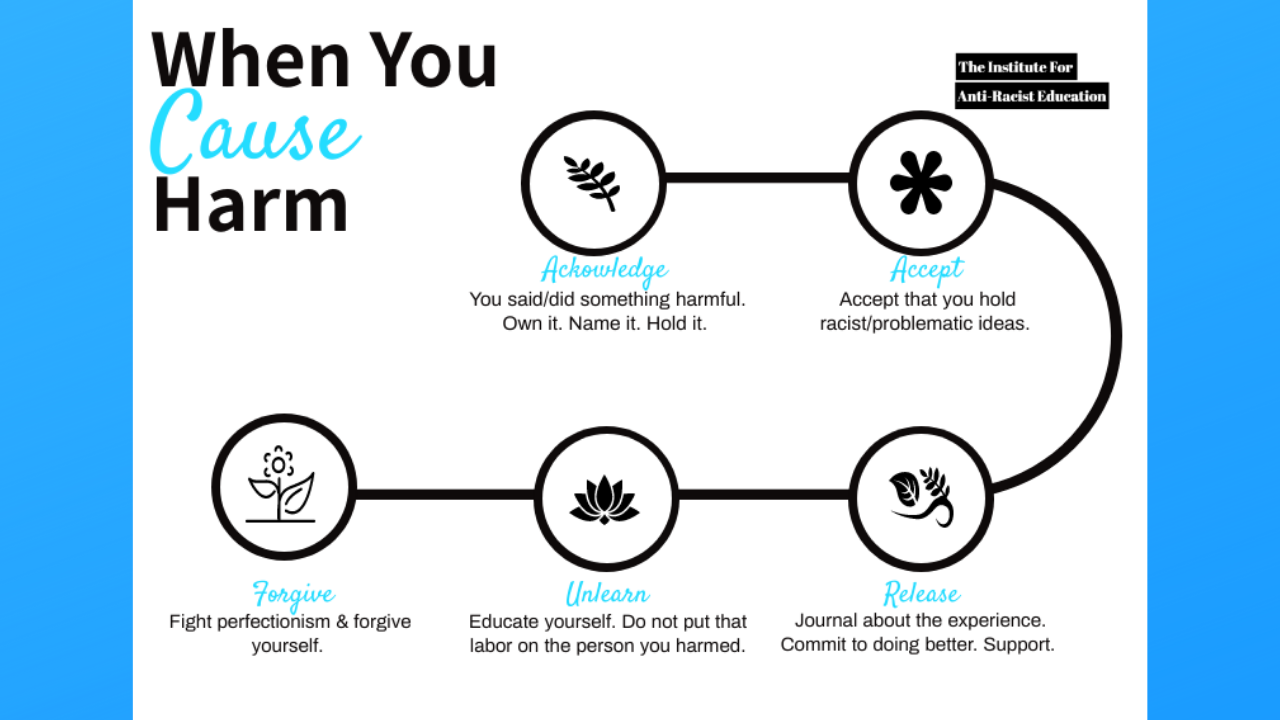When We Cause Harm: A Framework

When We Cause Harm: A Framework
by Ashley Y. Lipscomb
“I want to know the Love way of rising up, fully alive from the depths within me, letting this new way of life reshape my way of seeing. -Morgan Harper Nichols
We all have been socialized in a world that is not loving at its core. We have ingested the harshness of intersectional oppressive systems that refuse to allow humanity to flourish in all of its goodness. Therefore, harm is inevitable. As we do this unlearning work together, it is important to establish a culture of love, repair, healing, and joy in your classrooms and schools.
I have been in situations where white persons have tried to apologize for some sort of mistake. They unburdened their guilt, tears, shame on me and asked that I “teach them” about their mistakes with my own trauma and heartbreak. No more. I developed this framework that serves as an entry point. Not an end all be all. Adapt this for you. The point is, do not force more undue emotional labor on those whom you have harmed.
Acknowledge: You said/did something harmful. Own it. Name it. Hold it. Apologize for your wrongdoing without asking for forgiveness. You need not defend your actions or over-explain them. Simply, “I did/said [this] and it impacted you [this way], and for that, I apologize. I am committed to [doing this action] to ensure I am mindful of this in the future.”
Accept: Do not focus on whether this made you a bad person. That is unproductive. Instead, accept that you hold racist/problematic ideas, ideologies, and beliefs whether you are aware of them or not. Acceptance is the first step toward transformation and growth; it acknowledges that more work needs to be done and offers a path forward. Also, accept that the other person does not owe you forgiveness nor absolution.
Forgive: Resist perfectionism and forgive yourself. Explore what forgiveness means to you and what it does for you.
Unlearn: Educate yourself. Do not put that labor on the person you harmed. There are several books, podcasts, etc., that will be useful for your learning. If you must process this harm, do so with someone who shares similar privileges and can process with you.
Release: Name what healing looks like for you, journal about the experience, and write about the ways you will hold yourself accountable for your own growth. Engage in your healing practice (meditation, journaling, prayer, chanting, hiking, stretching, etc.) and move on.
Contact us to learn more about this framework and how to bring our We ARE Open to the Uncomfortable: Having Important Conversations About Race, Class, & Culture with Colleagues & Students Workshop to your school.
Want anti-racist resources to come straight to your inbox? Sign up for our weekly newsletter!

